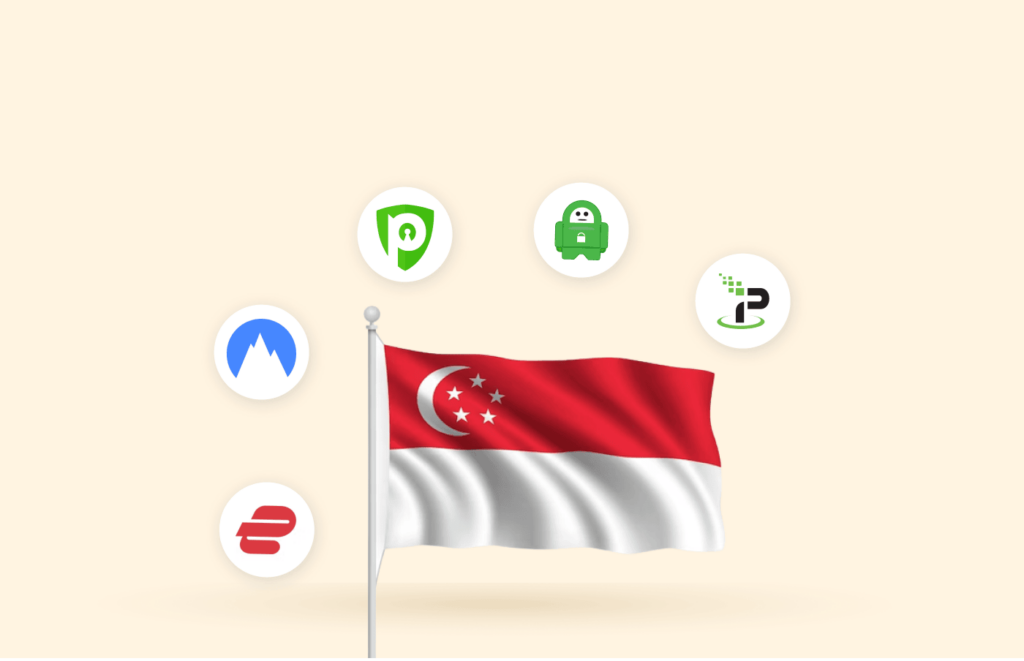Singapore is considered a next-generation country — advanced, prosperous, and stable. Yet, things are not as far advanced in the censorship arena as they would seem. The country’s government is not very vocal about internet censorship and domestic limitations for its citizens. However, internet users in Singapore still need VPNs to maintain complete online privacy.
In this article, we review the top VPN services to use in Singapore for an unrestricted online experience.
Top Singaporean VPNs – Quick list
Using our knowledge and experience, we found five VPN providers working well to evade Singapore content geo-restrictions. Of course, we will share the details for every service in this guide. But if you are in a bit of a rush and need to know only the names of those VPNs, here they are.
- NordVPN: The most advanced service in the market will do the job.
- ExpressVPN: The best VPN you can use in Singapore.
- Private Internet Access (PIA): The largest server fleet in the VPN-verse includes Singaporean nodes.
- IPVanish: The superb service and versatility include good performance in the Pacific rim.
- PureVPN: The most successfully audited VPN in the business works well in the far East.
Do I really need a VPN in Singapore?
Yes, you do. Singapore is one of those territories where every conscious user should have a VPN. Freedom House considers Singapore’s internet as “partly free,” with a low score of 54, which dropped from a higher score last year. The score is near those of Guatemala, Honduras, and Indonesia, which are not precisely strongholds of internet freedom.
Singapore’s government has no issue with using spyware on citizens, and it’s also concerned with governing internet access “for the sake of citizens’ welfare.”
So, within the particular Singapore legal and political framework, a VPN will give you these benefits:
- Avoid restrictions. Citizens in Singapore must live with some restrictions on their internet access. Social media, gambling websites, streaming platforms, and news websites are among the favorite websites to block in most cases. However, good VPNs will let you use the internet as if nothing was forbidden for you to see, even in the most restrictive environments.
- Uphold your security and privacy. In Singapore, the government needs no warrant to monitor your internet usage. And the local ISPs can also make a buck by selling that information to the government. However, even the most careful logs won’t give away your activities if you’re using a VPN because the VPN encrypts everything.
- Use P2P networks without losing any sleep. Singapore keeps an eye on BitTorrent users and other P2P networks. It doesn’t take copyright violations lightly because its free trade agreement with the US includes articles on this issue. Therefore, sharing files online could get you in trouble if the Singapore authorities catch you. With a VPN, they won’t, and you won’t need to think about it.
- Avoid throttling. Some ISPs will limit your speeds for a given activity –usually, the one you do most. If you’re on a VPN, they can’t tell what you’re doing, so they won’t be able to limit your bandwidth.
How can you find a good VPN for Singapore?
The VPN market became overcrowded with vendors after Snowden’s revelations brought digital privacy concerns to the mainstream. Some providers focus on security at the cost of speed. Some others strive to offer a balanced service in which the best protection can exist along with functionality. Many others are nearly fraudulent in that they don’t even give you the most basic services a VPN worthy of the name should.
So how can you tell which are the good ones? Moreover, how can you know which ones will help you best while you’re in Singapore?
You don’t need to find out. Our staff already did the work so you can focus your energy and attention on other things. They dug deep into their deep VPN expertise, looking for services that score high in the following points:
- Nodes within Singapore: Local servers are always the best option unless you have a specific reason to choose servers based in a particular country.
- Speeds: Using a VPN will always cost you something in terms of speed. However, a good one should be efficient enough not to notice your speed losses unless you measure them carefully.
- Reliability: Your link to the server must be stable, and the functionality you get across the network should be the same always.
- Security: Good encryption and safety against all types of DNS and IP leaks are not supposed to be optional.
- Privacy: A VPN that cares about your privacy and anonymity should not keep any logs of your activities within the network.
- Unblocking abilities: Bypassing geo-blocks in video streaming services has become VPNs’ most important use case. So we want VPNs that can do this correctly.
The five best VPNs for Singapore – The complete list
1. NordVPN

One of the best VPNs around for its impressive performance. It works perfectly-well in Singapore.
Pros
- Responsive customer support
- Tremendous cross-platform compatibility
- Even works in repressive regions like China
Cons
- Variety of options complicates things for users
NordVPN is one of the most advanced VPNs in the business, and it stands out even more when considering the Singaporean case. The network includes 63 servers in the island nation, a significant number considering the jurisdiction’s meager size. So as a Singapore-based user, you’ll always be spoiled for choice.
Security in NordVPN’s servers and apps comes from the AES-256-CBC/SHA-512 combo, which is military grade and the golden standard in the VPN world.
NordVPN owns every server in its network. It guarantees that every node sticks to the company’s policies. Additionally, they are all RAM-only, so they physically ensure the impossibility of keeping logs because they have no conventional hard disks to retain data upon reboot. RAM servers are also much faster than their traditional counterparts. Consequently, every server in NordVPN is fast, reliable, private, and a joy to use.
But we are giving you only the tip of the iceberg. NordVPN has plenty of additional features to enhance every aspect of your digital online life.
2. ExpressVPN

A top-notch and probably the best VPN service all-around. Your privacy is highly-secured while doing any online task inside or outside Singapore.
Pros
- Super-fast speed
- Unblocks almost every streaming site
- Top-notch privacy
Cons
- DoubleVPN feature is not available
ExpressVPN is our top pick for a VPN you can use in Singapore. This vendor enjoys the best reputation in the VPN arena because it’s been ahead of the market for an extended period.
The server network exclusively includes RAM-only servers, enhancing every node’s performance, speed, and reliability. Additionally, it makes it physically impossible to save any user logs in computers with no writable magnetic media. The network is extensive, and it has 62 computers in Singapore alone. So you can’t fail to find a fast one to serve you while you’re there.
ExpressVPN has many additional features, such as a kill switch, traffic obfuscation, an ad blocker, double VPN servers, and obfuscated traffic.
Express is one of the best tools for unblocking geo-restricted video platforms. It can handle the restrictions of almost any online video streaming service.
The one thing you need to know about ExpressVPN is that if any VPN can perform a task you want, this one is it. Securing your Singaporean internet experience is included in that list.
3. Private Internet Access (PIA)

Most extensive server network. It has decent reputation all around the world.
Pros
- Larger number of servers
- Good connection speed
- Supportive customer support
Cons
- Based in 5-Eyes jurisdiction (the US)
Private Internet Access (PIA) has the largest sever fleet in the VPN-verse. It has nearly 30,000 servers, and plenty of them are in Singapore.
While PIA is perhaps the weakest VPN in our list regarding speeds and video streaming, it remains a solid option with good functionality, reliable server links, and plenty of additional features.
PIA’s encryption breaks the industry’s rule as it’s AES-128 instead of 256. However, this is not a deal breaker since the 128 version of AES remains as impervious to attacks as its bigger 256-bit brother. And if you must have the 256 version, you can always change your app’s settings and have it as your default encryption option instead of AES-128.
The vendor is strong on user privacy, as it’s been shown in several court cases already. It’s walking the walk on this issue despite its US location, which is commonly regarded as antagonistic to individual privacy rights.
4. IPVanish

A well-established VPN that performs perfectly-well in any sort of online task inside or outside Singapore.
Pros
- Advance security and privacy features
- Reliable speed
- Budget-friendly
Cons
- No free trial
IPVanish is a perfect VPN to use in Singapore. The VPN’s Asian section is vast and has 48 servers in Singapore alone. Traveling around Singapore, you’ll find plenty of WiFi hotspots. IPVanish is an excellent option to protect your traffic as you use public, unencrypted WiFi connections.
IPVanish’s “On Demand” feature allows you to have a fully automated connection, so you don’t have to worry about anything as long as you’re in Singapore.
Encryption is AES-256. The apps have a functional kill switch, and a SOCKS5 proxy makes torrenting easier, so you can use your device or computer for any task you fancy anywhere in the world, even in Singapore.
5. PureVPN

VPN service that first priority is your privacy and does not compromise on that. You can enjoy any show online without risking you privacy while you are in Singapore.
Pros
- Stable speed
- Compatible with almost all kind of devices
- Good customer support
Cons
- UI app is little complicated
PureVPN excels at security, as the regular audits it undergoes can attest. The network’s performance is solid and has some neat features in the browsing category. It’s an excellent option for Singapore.
PureVPN is among the best VPN vendors because it adopted WireGuard, the most efficient and advanced VPN protocol. As a result, it achieves a balance between the highest possible speeds without sacrificing any security. The speeds allow PureVPN’s servers to support video streams comfortably, torrenting with large files and browsing. No lags, no buffering, no problems.
The AES-256 encryption secures every user’s traffic, and the British Virgin Islands’ favorable stance on digital privacy facilitates the provider’s privacy policy.
This VPN can accomplish any task you throw at it, and it will even do so if you’re in Singapore.
How we picked the best Singapore VPNs
We have already told you what to consider for a good Singapore VPN. Let us tell you why our staff chose the five entries on our list to offer you the best five Singapore VPNs.
- Server count. Every entry in our list has an extensive server network around the world. Also, they all have servers within Singapore. Numbers matter because smaller server networks tend to have overworked servers, which causes links to lose their reliability. After all, too many users are trying to connect to them.
- Security and privacy. Security and privacy are supposed to be the primary points in using a VPN wherever you are. But they are even more critical when using a VPN to evade local censorship. These VPNs will make you untraceable once you beat the content bans, and they don’t keep logs on your user history.
- Speed. Fast connections are always better. Our top five VPNs for Singapore are among the fastest in the industry. Moreover, some will allow you to retain as much as 92% of your baseline speed, which is remarkable.
- Streaming. Video streaming was a big thing already when the epidemic made it explode. And VPNs are at the heart of video streaming usage as they allow users worldwide to see the best content meant to be only available in a single country.
- Customer support We prefer a service that is so easy to use and reliable that we’ll never need customer support. However, it has to be solved quickly and reliably when something happens. Our chosen providers know this, so they all have 24/7 support, so you’ll never have to wait.
- Price. VPNs used to be a luxury toy for the most paranoid geeks. The times have changed. Nowadays, a good VPN is a necessity for every conscious internet user. Therefore, a good VPN shouldn’t break the bank. Our top five Singapore VPNs offer plenty of bang for your buck.
Can I use a free VPN in Singapore?
You can definitely use a free VPN in Singapore, but you shouldn’t. Specifically, looking for a free VPN with a Singapore location or any other IP is a terrible idea. We always advise our readers to stay as far away from them as possible.
Free VPNs are corporations, and they are in business to make a buck. However, their business is not to protect your security and privacy — that’s what paid VPNs do. Instead, they are in the business of collecting user logs they can sell to advertisers and other data miners.
In addition, some are known to spread malware or hijack their users’ resources and transfer them to other clients (paying clients, obviously). So, the problem with most free VPNs is that they don’t protect you in any way. Instead, they create privacy and security hazards you shouldn’t have and do it with your consent (yes, it’s always in their terms of use).
If the privacy problems in free VPNs are not enough to dissuade you, consider this, too: they are awful. The functionality in most free VPNs is poor at best. They don’t have the resources (bandwidth, servers) to make things work smoothly. That results in overworked, slow servers with weak links that break frequently. And your daily or monthly data usage is usually capped.
Remember that you need a VPN in Singapore because using the internet freely is risky. While you can easily download free Singapore VPN apps on your device, it will only increase your risks. So you will always be better off if you don’t use them.
VPNs to avoid in Singapore
The various internet restrictions in Singapore necessitate the use of a VPN. However, there are a few VPNs you should stay away from. In the past, these providers have violated their commitment to ensuring users remain anonymous. They include:
PureVPN
The provider collaborated with the FBI in uncovering Ryan Lin, who was accused of online blackmailing and extortion of a 24-year-old lady. In response to a formal complaint, a US law enforcement agency intervened. The online footprints led them to PureVPN, which analyzed its log records and uncovered who was responsible.
Even though PureVPN did have a “no-logs” policy at the time, it maintains that it did not record any conversation material.
HolaVPN
HolaVPN is an Israel-based service that became popular before its downfall in 2015. The provider unlawfully split users’ bandwidth for copyright distribution and DDoS attacks.
While we do not support using VPNs for illegal activities, as in the case of Cody Kretsinger and Chris Dupuy, we believe that a VPN provider should prioritize anonymity, privacy, and security above everything else. Breaking such trust goes against the principle upon which VPNs are built and hence, shouldn’t be trusted in the future.
UrbanVPN
The service uses a peer-to-peer network that doesn’t encrypt your sensitive data and collects your internet usage information. Urban VPN claims you can opt out of the peer-to-peer network with a paid plan.
Singapore VPN
The service has been downloaded over 100,000 times. Nevertheless, this should not fool you into trusting the provider with your private data. After going through its terms of service, it was evident that Singapore VPN retains your IP address and timestamps. It also supports ads, which can be annoying.
Furthermore, Singapore VPN is owned by Next Hour, which owns five other VPNs. The official developer website for each application oddly links to the payment service provider Alphapos. The shop appears to be the same for all of them.
UFO VPN
UFO VPN isn’t really a virtual private network. The service uses a peer-to-peer overlay network where users swap IP addresses with each other. However, the service has significant drawbacks since strangers might use your IP address to conduct illegal activities.
How do I use a VPN in Singapore?
Using a VPN anywhere worldwide is usually straightforward unless the local government has blocked their websites. From Singapore, you’ll get started with your new VPN if you follow these steps:
- Choose a VPN provider with servers in Singapore. NordVPN is our top pick, but any of the choices on our list will do.
- Go to your device’s app store and find the app your provider offers for your device.
- Install it.
- Launch your VPN app. Log in.
- Pick a server in the network from any country you’d like.
- You’re there!
If you want to ensure that everything is working, use this IP address tool to figure out what address everybody else on the internet sees as yours. Most vendors will tell you within their apps what IP the server assigned to your device.
How to get a Singaporean IP address

Here’s what you do if you need to browse with a Singaporean IP address.
- Choose a VPN provider with servers in Singapore. NordVPN is our top pick, but any of the choices on our list will do.
- Go to your device’s app store and find the app your provider offers for your device.
- Install it.
- Launch your VPN app. Log in.
- Find the Singapore servers in your VPN network, and pick one to connect to.
- You’re there!
How can I blog anonymously from Singapore?
Singapore, one of the freest capitalist societies in the world, is not as generous with political freedoms as it is with economic ones. As a result, online bloggers have been arrested, and the country’s press freedoms are not universal. Additional incidents in this arena include bloggers and media officers detained, fined, or jailed for comments about religious groups or the country’s prime minister.
So the writing is on the wall: if you’re a journalist or a blogger, primarily if you deal with political comments, you must blog anonymously if you’re in Singapore. Adopt these practices:
- Create an alias.
- Always use a VPN, and make sure your traffic is always encrypted.
- Use The Onion Browser (Tor).
- Host your blog on the darknet.
- Do not spend time online unless you absolutely must.
- Remain alert always.
- Avoid blog growth practices. Safety is your priority, not monetization.
Is using VPN legal in Singapore?
Yes, using VPNs is perfectly legal in Singapore as of 2026. But while the VPN service itself is legal, if you use it to see banned material or do some other activities, it could be deemed illegal in the eyes of the authorities.
And this is why you need a top-notch VPN if you use one in Singapore. In addition, you need to ensure that your VPN vendor will never spill the beans on you. That is because getting around the local restrictions is not enough. You also need to ensure that the government will never know.
However, if Singapore is in your future, you should watch the tech news. The government has been pushing to make VPNs illegal (like in China and Iran). The authoritarian nature of the local “democracy” suggests that this will happen sooner or later. But VPNs are still legal as of now.
FAQs
Yes, you can. VPNs are perfectly legal. And the country’s high density of public WiFi networks makes VPNs necessary.
If your VPN is one of the best in the business, it will keep you safe from Singaporean laws.
QQ Music is a music streaming service. You can access it anywhere in the world, but if you want to hear the music, you must be in China. So again, our VPNs are the answer. Pick a server based in China, and you’ll be able to hear all the music in QQ.
It depends on how you use your VPN service. For example, you can use traffic obfuscation if your VPN supports it. In this case, your ISP will never know you’re using a VPN. On the other hand, if your VPN can’t obfuscate your traffic, then your ISP can find out you’re on a VPN.
The Singapore government prohibits producing, distributing, or selling pornographic materials. However, you can’t be charged for privately viewing pornographic materials. It’s rare to find citizens facing such charges since the law is rarely enforced, and most pornographic sites are inaccessible in the country. However, if you’re after streaming or downloading pornographic content, consider using a VPN to stay anonymous.
Generally, it’s legal to use torrents in Singapore. However, the government passed a law in 2014 that prohibited downloading or uploading copyrighted materials. Before the enactment of this regulation, the copyright holder had to notify the ISP to disable access to the content, but ISPs did not need to comply with the law. Copyright infringement charges have been evident in the past. For instance 2015, three users were charged $5,000 for downloading copyrighted movies. While the parties resolved to an out-of-court settlement, the case is a caution to those who disregard the law.
